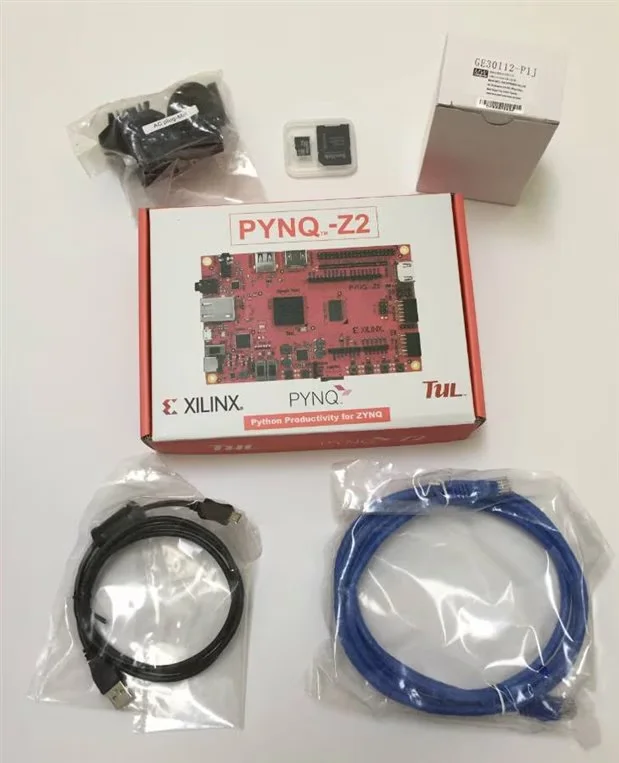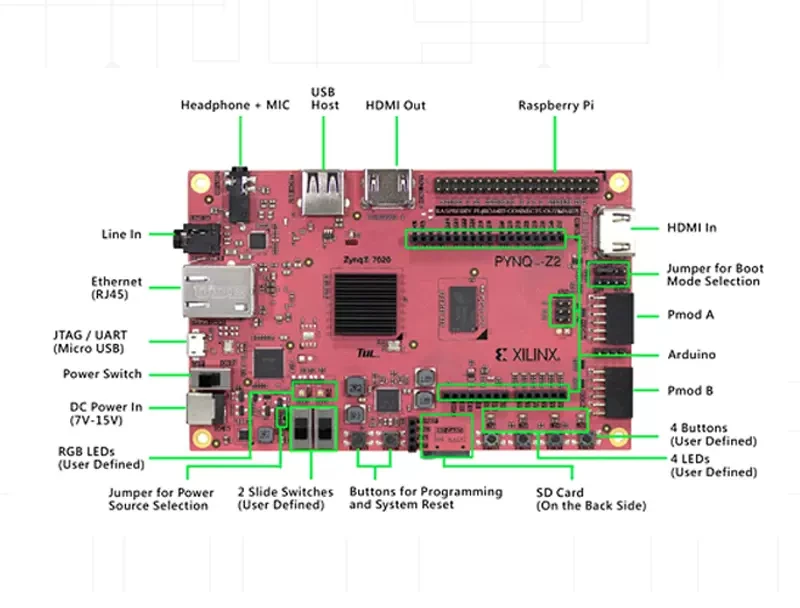NaN
/
of
-Infinity
Karim and de Jong International
FPGA Development Board Xilinx PYNQ Z2 ZYNQ 7020 Artificial Intelligence Python
FPGA Development Board Xilinx PYNQ Z2 ZYNQ 7020 Artificial Intelligence Python
Regular price
€882,98 EUR
Regular price
€1.324,47 EUR
Sale price
€882,98 EUR
Unit price
/
per
Taxes included.
Couldn't load pickup availability
Introduction
PYNQ-Z2 is a FPGA development board, it is based on the ZYNQ XC7Z020 FPGA as the core, the use of programmable logic in the ZYNQ and Arm processor can build powerful embedded systems, PYNQ's open-source framework allows embedded programming users to give full play to the functions of the Xilinx ZYNQ SoC without the need to design the programmable logic circuit. Using Ethernet as the com
munication method between PC and board, this development board not only supports the traditional ZYNQ development method, but also supports Python for SoC programming, and the code can be developed and debugged directly on PYNQ-Z2. Programmable logic circuits are imported in the form of hardware libraries and can be programmed via an API, which is basically the same way as importing and programming software libraries.
The PYNQ-Z2 is equipped with Ethernet, HDMI input/output, MIC input, audio output, Arduino connector, Raspberry Pi connector, 2 Pmods, user LEDs, buttons and switches. Compatible Raspberry Pi connector, Arduino shield connector and Pmod connector can support a wide range of accessory expansion, and these interfaces can also be used as GPIOs.
PYNQ is an acronym for Python On Zynq, which is a software development framework that guides the design of interfaces between the hardware layer, driver layer, and application layer. The PYNQ framework decouples the underlying hardware FPGA implementation details from the use of the upper application layer through high-level encapsulation, allowing the upper application developer to call the FPGA module through Python programming. It is suitable for large-scale designers and developers, and can help users implement a wide range of high-performance embedded applications, including: parallel hardware execution, high-frame-rate video processing, hardware-accelerated algorithms, real-time signal processing, high-bandwidth IO, and low-latency control.
PYNQ combines all the advantages of ZYNQ and Python, and can be used in conjunction with DF arduino expansion boards, Raspberry Pi expansion boards; it can be widely used in machine learning, research and prototyping.
Technical specifications
PYNQ-Z2 is a FPGA development board, it is based on the ZYNQ XC7Z020 FPGA as the core, the use of programmable logic in the ZYNQ and Arm processor can build powerful embedded systems, PYNQ's open-source framework allows embedded programming users to give full play to the functions of the Xilinx ZYNQ SoC without the need to design the programmable logic circuit. Using Ethernet as the com
munication method between PC and board, this development board not only supports the traditional ZYNQ development method, but also supports Python for SoC programming, and the code can be developed and debugged directly on PYNQ-Z2. Programmable logic circuits are imported in the form of hardware libraries and can be programmed via an API, which is basically the same way as importing and programming software libraries.
The PYNQ-Z2 is equipped with Ethernet, HDMI input/output, MIC input, audio output, Arduino connector, Raspberry Pi connector, 2 Pmods, user LEDs, buttons and switches. Compatible Raspberry Pi connector, Arduino shield connector and Pmod connector can support a wide range of accessory expansion, and these interfaces can also be used as GPIOs.
PYNQ is an acronym for Python On Zynq, which is a software development framework that guides the design of interfaces between the hardware layer, driver layer, and application layer. The PYNQ framework decouples the underlying hardware FPGA implementation details from the use of the upper application layer through high-level encapsulation, allowing the upper application developer to call the FPGA module through Python programming. It is suitable for large-scale designers and developers, and can help users implement a wide range of high-performance embedded applications, including: parallel hardware execution, high-frame-rate video processing, hardware-accelerated algorithms, real-time signal processing, high-bandwidth IO, and low-latency control.
PYNQ combines all the advantages of ZYNQ and Python, and can be used in conjunction with DF arduino expansion boards, Raspberry Pi expansion boards; it can be widely used in machine learning, research and prototyping.
Technical specifications
- Appearance size
- 87mm*140mm
- ZYNQ XC7Z020-1CLG400C Motherboard Info:
- 650MHz dual-core Cortex-A9 processor
- DDR3 memory controller with 8 DMA channels and 4 high performance AXI3 slave ports
- High bandwidth peripheral controllers: 1G Ethernet, USB 2.0, SDIO
- Low bandwidth peripheral controllers: SPI, UART, CAN, I2C
- Programmable from JTAG, Quad-SPI flash and microSD card
- Artix-7 Series Programmable Logic
- 13,300 logic slices, each with four 6-input LUTs and 8 flip-flops
- 630 KB of fast block RAM
- 4 clock management slices, each with a phase-locked loop (PLL) and mixed-mode clock manager (MMCM)
- 220 DSP Slices
- On-chip analogue-to-digital converter (XADC)
- Storage:
- 512MB DDR3 with 16-bit bus @ 1050Mbps
- 16MB Quad-SPI Flash with factory-programmed special identifiers (48-bit EUI-48/64™ compatible)
- MicroSD slot
- Power supply:
- Powered by USB or any 7V-15V power source
- USB and Ethernet:
- Gigabit Ethernet PHY
- USB-JTAG programming circuitry
- USB-UART Bridge
- USB OTG PHY (host supported only)
- Audio and Video:
- 3.5mm TRRS jack with 24bit DAC and I2S protocol support
- 3.5mm line-in jack
- HDMI receive port (input)
- HDMI source port (output)
- Switches, buttons and LEDs:
- 4 pushbuttons
- 2 Slide Switches
- 4 LEDs
- 2 RGB LEDs
- Expansion Connectors:
- Two standard Pmod ports
- 16 FPGA I/O ports (8 Pin shared with Raspberry Pi interface)
- Arduino Shield Connector
- 24 FPGA I/Os
- 6 single-ended 0-3.3V analogue inputs for XADCs
- Raspberry Pi Connecto
- 28 FPGA I/O (8 shared with Pmod A interface)










